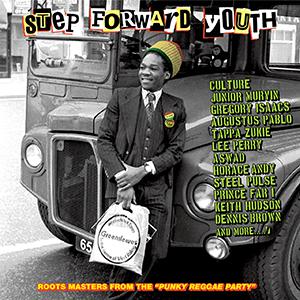For once, their 'Strictly The Best' compilation will only be released in the new year, so Greensleeves/VP Records ends 2018 with 'Step Forward Youth', zooming in on the relationship between punk and reggae.
Last year director Don Letts still presented 'Two Sevens Clash: Dread Meets Punk Rockers', a documentary on the same theme, and you may consider this 36 track double compilation album as a nice accompanying reggae soundtrack. The first seeds of the symbiotic relationship between punk and reggae can actually be traced back to the early nineteen sixties, when British Mods (working class youngsters who stood out for their musical tastes, but also because of the way they started dressing, wearing tailor-made suits and parkas, and the scooters they moved around on) started to importing and playing American rhythm & blues, but also ska and rocksteady (or Blue Beat as the genres in the United Kingdom were called because of the label of the same name on which many of the releases appeared) on a large scale. Towards the end of the 1960s, the Mods had to give way to the skinhead subculture, opposing what they considered to be the bourgeois hippie movement of the time and fraternizing with the rude boy subculture of Jamaican immigrants in the United Kingdom. Apart from ska and rocksteady, dub and reggae were also among the preferred music genres of the skins.
From the mid-seventies onwards, punk culture emerged, characterized by young people who, in their clothing style and music, rebelled against the establishment. And even though at first sight this scene had little in common with the reggae sound imported from Jamaica, it soon came to a symbiosis. Music journalist Michael de Koningh and author Marc Griffiths nicely summarize in the liner notes on 'Step Forward Youth': "One of the most interesting developments in the music during 1977 was the crossover between reggae and punk/new wave. Although light years apart in terms of sound, the two had much in common. Both genes were classified as "underground", and were rebellious and anti-establishment in content. The punks and the Rasta's formed part of the great dispossessed, and were drawn together as a result. Both types of music often came to the market by way of DIY, cottage-industry-type labels, produced on shoestring budgets and a flying-by-the-seat-of-their-pants philosophy. In 1979 reggae band Misty In Roots signed punk rockers The Ruts to their People Unite label, a perfect example of this ethos. And, like punk, reggae received little airplay. There was a hardness and "reality" inherent in both genres, and a complete lack of any hype or commercialization in their promotion.".
Moreover, the two subcultures found each other in their aversion to racism. Michael de Koningh and Marc Griffiths: "Further bonds between reggae and punk came about as a result of the rise of the right wing National Front during the late 1970s, as black and white united to join forces against fascists on the market. The Rock Against Racism movement was very much the vibe of 1978, when punk bands shared the bill with reggae acts like Aswad, Steel Pulse and Misty at many a RAR benefit gig.". We could go on and on delving into one anecdote after the next (Patty Smith re-releasing Tappa Zukie's debut album on her Mer label, Sex Pistols-front man Johnny Rotten/John Lydon joining Virgin Records boss Richard Branson in 1978 Jamaica to sign one reggae act after another, Dennis Bovell producing the debut album of punk girl trio The Slits, or Don Letts who played reggae as deejay in the legendary London punk club The Roxy roots between and after performances of punk bands like The Clash, Billy Idol and The Heartbreakers), but for that we'd like to refer you to the Harry Hawks' extensive liner notes.
The whole symbiosis was of course crystallized in Bob Marley's 'Punky Reggae Party', (also from 1977, unfortunately not included on this compilation, but the track list of 'Step Forward Youth' does feature a great number of justifiably played to death reggae classics from Jamaica and the UK, ranging from Augustus Pablo's 'King Tuby Meets Rockers Uptown' and Lloyd Parks' 'Mafia' over Junior Byles' 'Fade Away', Dillinger's 'Cokane In My Brain', and, of course, Culture's 'Two Sevens Clash', but also some lesser known and/or forgotten gems like Reggae Regular's 'The Black Starliner', 'Police & Youth In The Grove' by the illustrious Have Sound Will Travel, Michael Rose's original version of 'Guess Who's Coming To Dinner' from before he joined Black Uhuru, or 'Rebel' by the Barry Ford Band. More than two hours of pure enjoyment divided into 36 'Roots Masters From The 'Punky Reggae Party''!


